_We may earn revenue from the products available on this page and participate in affiliate programs. Learn more ›
_
Best Overall
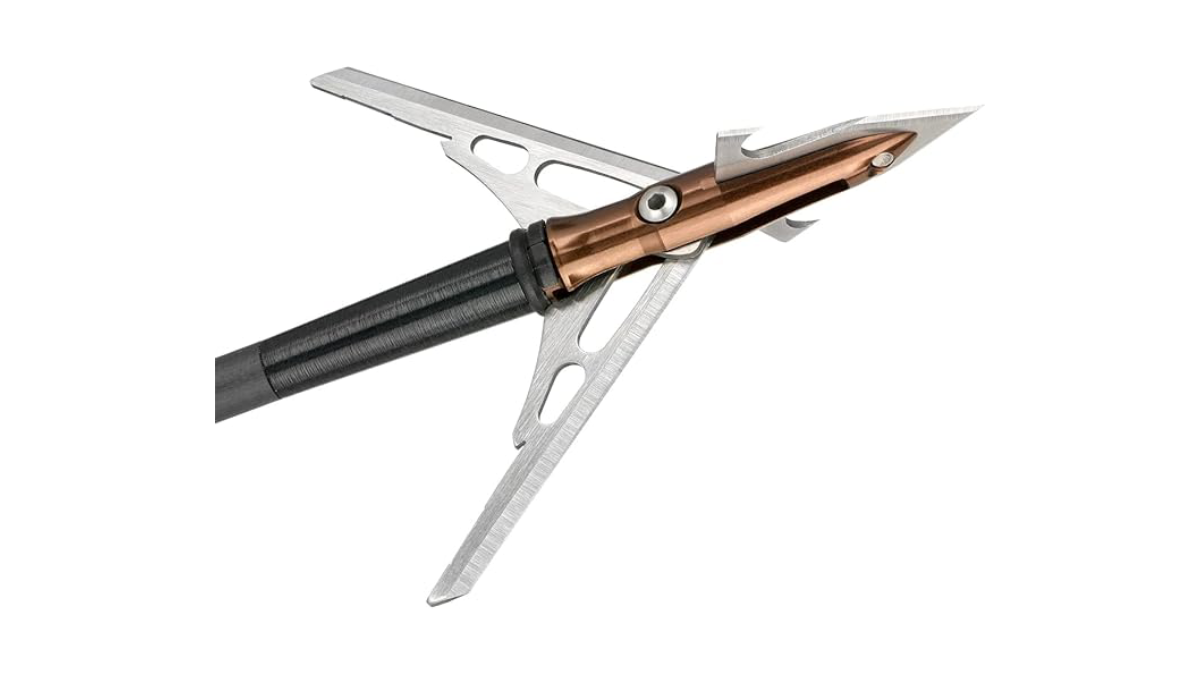
Rage X-treme Turkey Broadhead
Best Mechanical
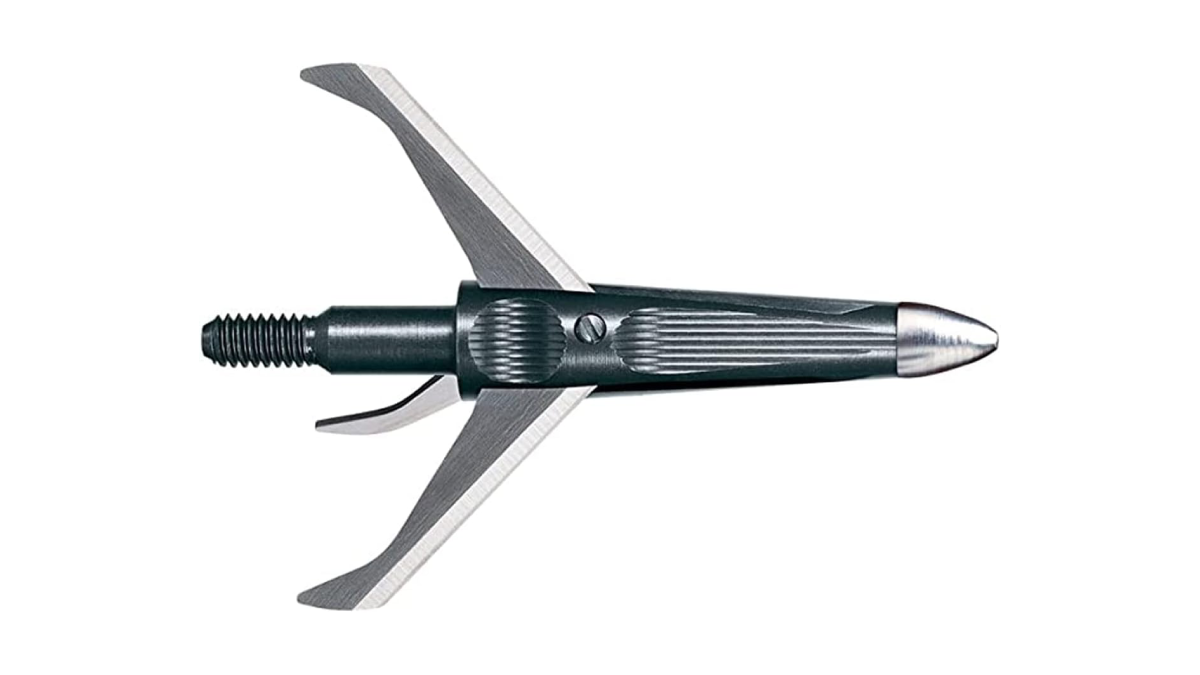
New Archery Products Spitfire Gobbler Getter Broadhead
Best Fixed-Blade
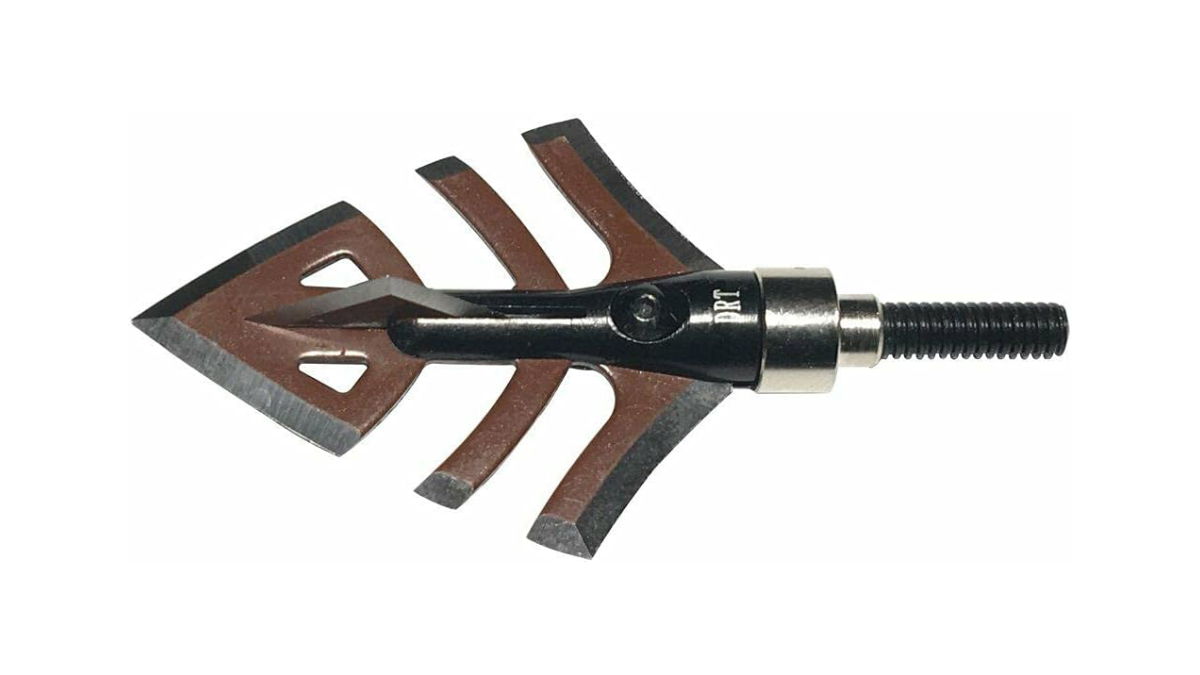
DirtNap Gear Shred Head Broadhead
Modern turkey broadheads help deliver lethal shots to take down gobblers fast. And when follow-up shots aren’t an option—which is often the case in bowhunting—your initial shot is even more critical. The added movement of drawing a bow increases the difficulty of connecting with a tom, putting even more emphasis on the ability of the broadhead
to do its job. These blades do this through controlled expansion and wide cutting diameters, some of which are designed to take the head clean off a turkey.
After years out in the turkey woods, we know what works—and what doesn’t—when it comes to bagging a bird. With clean kills and fast recoveries in mind, we rounded up the best turkey broadheads that are guaranteed to result in dead gobblers and short recoveries.
The Best Turkey Broadheads
Best Overall: Rage X-treme Turkey Broadhead
Best Mechanical: New Archery Products Spitfire Gobbler Getter
Best Fixed-Blade: DirtNap Gear Shred Head
Best for Head and Neck Shots: Magnus Bullhead Turkey Fixed Blade
Best Crossbow: Grim Reaper Pro Series Crossbow Broadhead
Best Budget: Swhacker 207 2″ Cut Broadhead
Best Overall: Rage X-treme Turkey Broadhead

Specs
Weight: 100 Grains
Material: Anodized aluminum ferrule with stainless steel blades
Cutting Diameter: 2.125”
Blades: 2
Blade Type: Hybrid
Pros
“Meat hooks” help snag on turkeys
Creates a devastating wound channel
Fly like field points
Cons
Blades bend easily
The extra low profile of Rage’s X-treme Turkey broadhead makes it ideal for crossbows. The smaller, fixed “meathook” blades start the cutting and help tear through turkeys with glancing blows. The blades expand over two inches for devastating wound channels, and the small hooks on each side of the tip help slow the arrow down after penetration, so the arrow is more likely to stay in the bird. The design maximizes damage, especially to the turkey’s wings, helping prevent an injured bird from flying away. Stainless steel blades and the aluminum ferrule help improve the broadhead’s overall durability. The Rage shock collar helps ensure reliable blade deployment every time you touch off the release.
Best Mechanical: New Archery Products Spitfire Gobbler Getter
Best Mechanical

Specs
Weight: 100, 125 Grains
Material: Aluminum ferrule with stainless steel blades
Cutting Diameter: 1.5”
Blades: 3
Blade Type: Mechanical
Pros
Rounded tips keep the arrow in the turkey
Compatible with most crossbows
Fly like field points
Cons
Blades bend easily
Smaller cutting diameter calls for more precise shots
The Spitfire Gobbler Getter is a variation of the brand’s proven Spitfire expandable broadhead, which has been a long-time favorite of deer hunters. The key design feature is the unique rounded tip, which helps slow penetration, maximize shock, and prevent pass-throughs. A turkey that still has an arrow in it is going to have a hard time flying away.
Like the original Spitfire, the Gobbler Getter utilizes NAP’s Micro Grooved Slimline Ferrule technology, allowing the ferrule to travel with less air resistance. The design makes these broadheads fly just like field tips.
Meanwhile, the three expandable blades are some of the sharpest on the market. NAP uses a rigorous proprietary process (called Diamize) to produce surgical sharpness that delivers massive hemorrhaging and quicker kills.
Best Fixed-Blade: DirtNap Gear Shred Head
Best Fixed-Blade

Specs
Weight: 100, 125 Grains
Material: Aircraft-grade aluminum ferrule with Teflon-coated stainless steel blades
Cutting Diameter: 1 3/16”
Blades: 4 (2 plus 2 bleeders)
Blade Type: Fixed blade
Pros
Punches through thick feathers
Modular weight system
Teflon coating for extra durability
Cons
Creates in-flight air noise
This is one bad-to-the-bone fixed-blade broadhead that delivers a near-perfect balance of penetration and terminal shock. The four-blade heads come out of the packages sharp enough to shred paper and fly as true as the standard 100-grain broadheads I use during deer season (Montec G5s for those with inquiring minds). I didn’t have to make any adjustments to my pins or my bow. They do produce a bit of in-flight noise, but I can’t see that being a huge issue on shots within 25 yards.
Shred Head broadheads have a removable weighted collar that adds 25 grains to the standard 100-grain design. These broadheads feature a double bevel design that helps them punch through thick turkey feathers that tend to slow down other fixed blades. The blades are also coated in Teflon, which increases durability and prevents rust, so these bad boys should last season after season.
Best for Head and Neck Shots: Magnus Bullhead Turkey Fixed Blade
Best for Head and Neck Shots
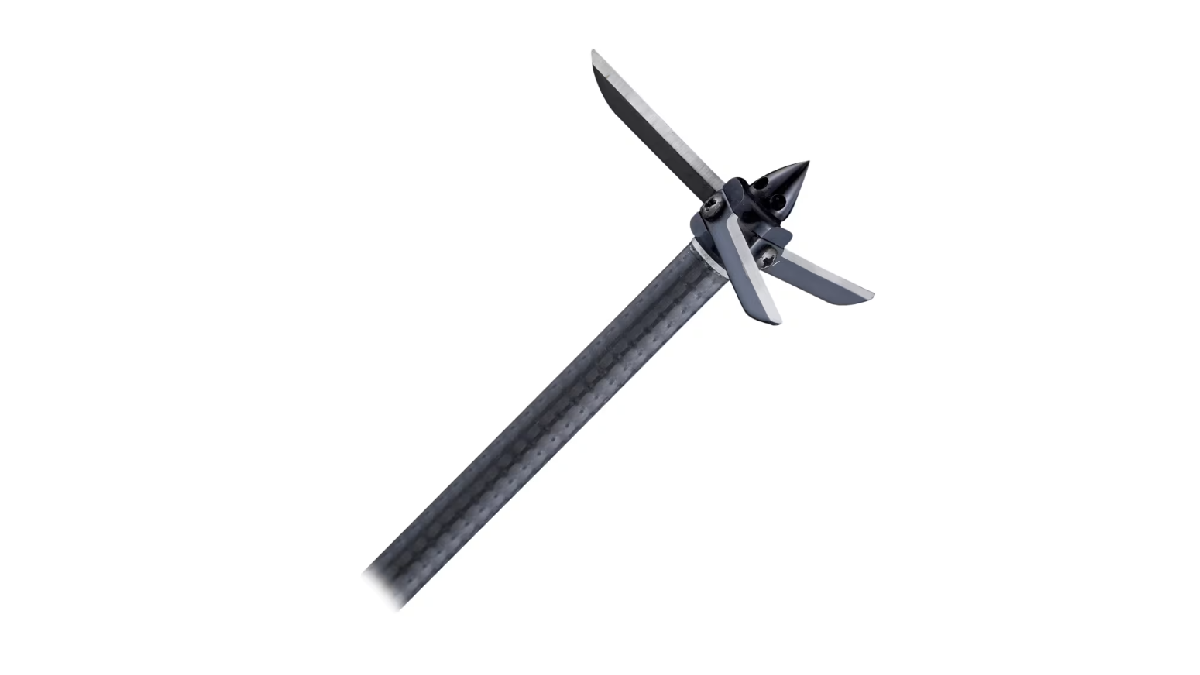
Specs
Weights: 100, 125 Grains
Material: Stainless steel
Cutting Diameter: 2 ¾” and 3 ¾”
Blades: 3
Blade Type: Fixed
Pros
Huge cutting diameter
Turkeys usually drop dead on the spot
Replaceable and reusable blades
Cons
Won’t fit in a standard quiver
Won’t work with most crossbows
The Magnus is a consistent turkey killer with an excellent reputation for quality. This is also our top choice for the best fixed-blade broadhead, and it comes in a 100 and 125-grain option, with the heavier broadhead sporting a giant 3 ¾-inch cutting diameter. These sharp blades have no problem severing the head right off a gobbler for an instant kill. And that’s the confidence you need in your broadhead so you can focus on drawing and putting the arrow where it needs to go. Some blades can be reused depending on where the bird is hit, but they are worth replacing if they get dulled up during penetration. Add the affordable price point, and you’re looking at the best turkey-specific broadhead on the market today.
Best Crossbow: Grim Reaper Pro Series Crossbow Broadhead
Best Crossbow
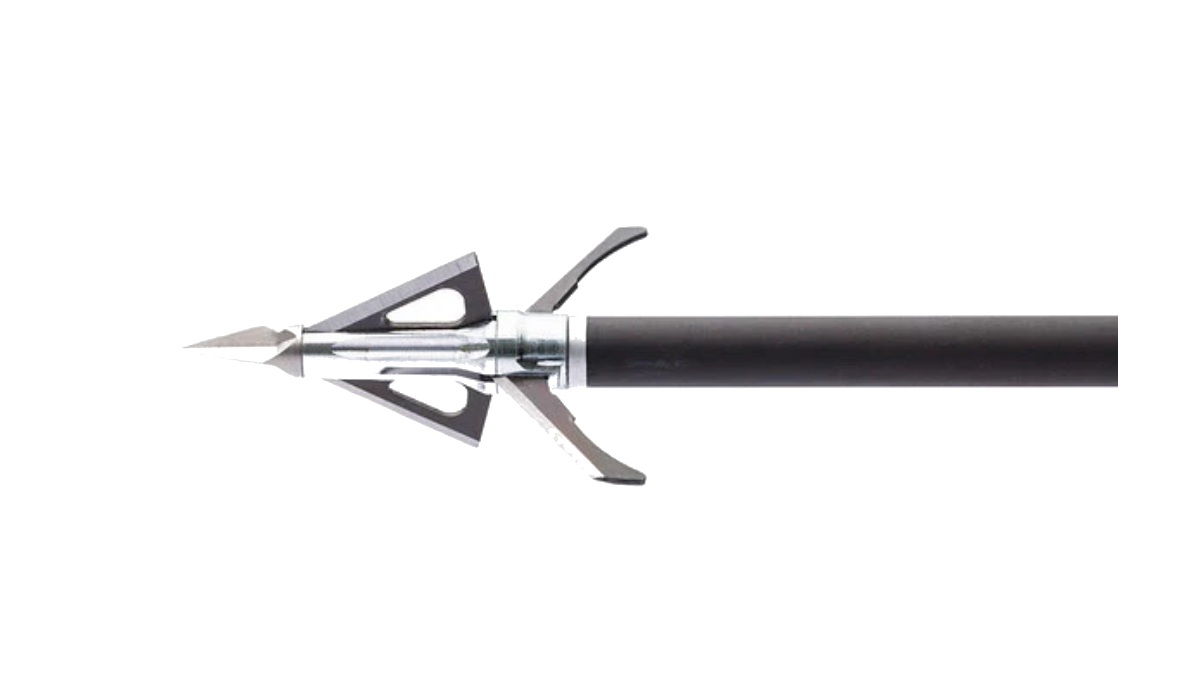
Specs
Weight: 100, 125, 150 Grains
Material: Anodized aircraft aluminum ferrule with stainless steel blades
Cutting Diameter: 1 ½”, 2”
Blades: 3
Blade Type: Mechanical
While most broadheads can pull double duty with your compound bow and your crossbow, some don’t work as well with the blistering velocities of modern crossbows, but these are different. Grim Reaper engineered their Pro Series Crossbow expanding broadheads to fly consistently and deploy reliably at higher speeds.
Featuring the same sharp, punching tip as the company’s popular Razortip mechanicals, these crossbow broadheads start cutting the moment they touch the bird. Upon penetration, 3 sharp blades deliver a massive cutting diameter that dumps energy and creates a devastating wound channel.
Best Budget: Swhacker 207 2″ Cut Broadhead
Best Budget
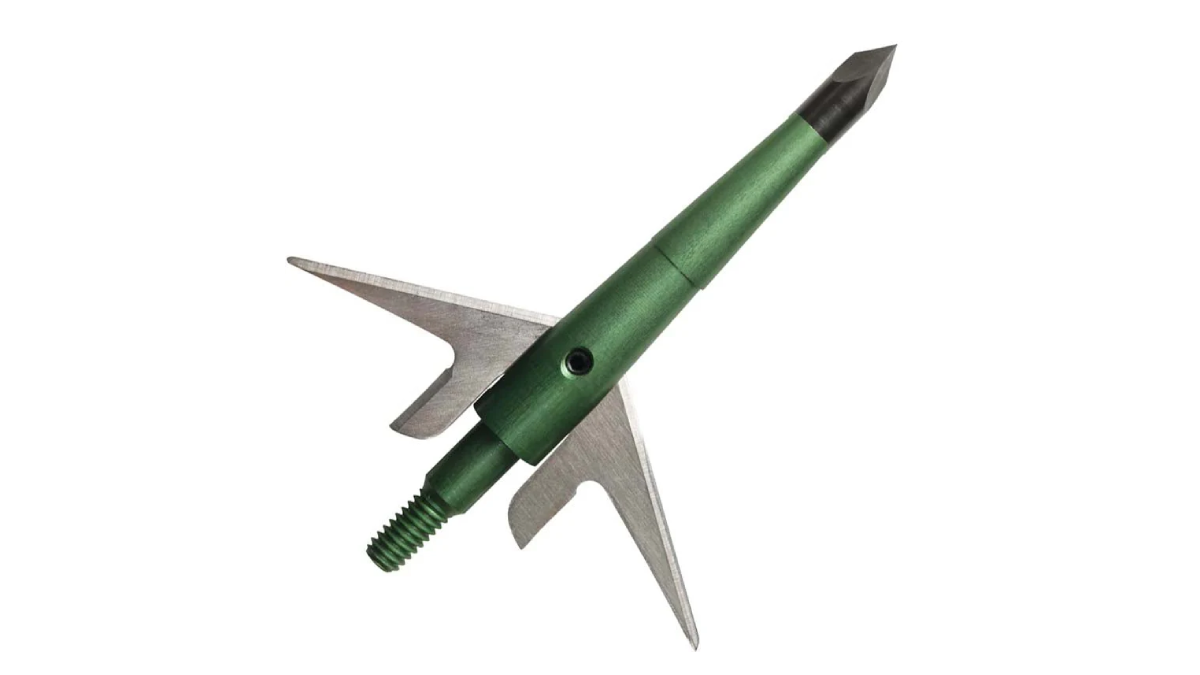
Specs
Weight: 100 Grains
Material: Anodized aircraft aluminum ferrule, hardened carbon steel point, stainless steel blades
Cutting Diameter: 2”
Blades: two sets of two blades
Blade Type: Mechanical
Pros
Affordable
Two-blade design delivers more momentum
Busts through tough wing feathers
Cons
Some hunters report deployment issues
Although this particular model from Swhacker isn’t advertised as a turkey broadhead, it still fits the bill. The design differs from the typical deer-hunting expanding broadhead in that it has two sets of edges. The first are smaller than the main blades and take less energy to punch through tough wing feathers. The second set is larger and only deploys inside the body cavity after the broadhead has penetrated about a half inch. The delayed deployment allows the main set of blades to remain ultra sharp so they can slice through vitals while the initial blades take the punishment of penetration.
While the price tag on these Swhackers isn’t exactly bargain basement level, they are super affordable in the realm of specialized turkey-hunting broadheads. At around ten dollars a pop, you won’t cry too much when you misjudge distance and send one sailing over a big gobbler’s back — at least not over the cost of the lost broadhead.
How We Tested Turkey Broadheads
A good turkey broadhead goes beyond just the ability to fly like a field point. It also needs to deliver a devasting blow to limit the chances of a wounded bird and failed recovery. That means the blade type, flight path, and cutting diameter play a huge role in the overall performance of the broadhead.
We talked with turkey fanatics and researched vital statistics of each broadhead before giving it our seal of approval. The most important factors we looked for include:
Cutting Diameter: How much damage will the broadhead do? Is there room for error on head and neck shots?
Mechanical or fixed blade: Do the blades expand or are they fixed? How does this affect the broadhead’s flight through the air?
Replaceable blades: Does the manufacturer offer replacements? Are the blades ruined after one use?
Value: How well does the price affect the sharpness and quality of the steel used in the broadhead? Can the broadhead easily be re-used?
Turkey Broadhead Buying Guide
As every turkey hunter knows, turkeys are a special breed of animal. While they share natural ranges with the popular whitetail, they require a different style of hunting. They also require a special type of broadhead.
Can you kill turkeys with your favorite deer-hunting set-up? Absolutely. But just because you can, doesn’t mean you should. Turkey hunting really does require something different. Here are a few key things to consider before you lay down your cold, hard cash on new broadheads this spring.
Fixed Blade Versus Mechanical
The great fixed blade vs. mechanical broadhead debate that rages in the big game hunting world also plays out in turkey hunting. Some hunters swear by one or the other and will argue their preferences to the grave. When it comes to broadhead design, the bottom line is that if you want to turn your shots into dead birds, you need something that will cut big holes. For this reason, a large number of turkey hunters choose to hunt with mechanically expanding broadheads.
Mechanical broadheads are also more likely to stay in the bird because much of the kinetic energy they carry downrange is used up in deploying the blades. Turkeys that are skewered with an arrow are less likely to fly or run very far, making them much easier to recover.
That doesn’t mean fixed blades aren’t viable options. Turkey-specific fixed blades, especially those designed to decapitate or partly decapitate, can deliver quick, humane kills. However, precise shot placement on a target smaller than a peach that is bobbing up and down and side to side is no easy thing, especially when you’re jacked up on adrenaline.
If you have a shorter draw length or you pull less than 50 pounds of draw weight, fixed blades may be the smarter option, even if you’re going for body shots. Mechanical broadheads shot from bows with slower velocities could have deployment issues, which essentially leaves you shooting gobblers with little more than field tips.
Accuracy
Whether you’re taking body shots or aiming for the neck, an accurate broadhead is a deadly broadhead. While you can probably make what you consider consistently accurate shots with the standard broadhead you shoot during deer season, deer-shooting accuracy and turkey-shooting accuracy are two different things. The breadbasket sweet spot on a deer is roughly the size of a pie plate. Turkeys are much smaller targets with much smaller vitals.
If you’re headhunting, landing an arrow is even trickier. You can get away with 5-inch groups at 30 yards on deer, but you want those groups much tighter for turkey season. Practice is the biggest factor in achieving that kind of precision, but you also need to choose a broadhead that flies true from your rig.
Head or Body Shots
Some turkey hunters swear the only way to kill a turkey with a bow is to slice off his head with a big-bladed broadhead. Others prefer to skewer them through the body. Your style of hunter will dictate the type of broadhead you need. If you’re going for body shots, you want a broadhead that won’t pass through. A bird that’s had an arrow pass completely through is going to flee the scene, and he isn’t going to leave much of a blood trail (if any) in his wake. A bird still stuck with an arrow has a hard time flying or running. He’s going to thrash around and probably die within eyesight.
Broadheads designed for decapitation don’t work well for body shots. Although they have large, winged, razor-sharp blades, those broadheads don’t stand up well to hitting a gobbler’s thick, feathered broadside.
FAQs
Q: Can I use deer broadheads for turkey?
Broadheads specifically designed for deer hunting will not be as effective for turkeys. Because many deer broadheads are designed for optimal penetration and a clean pass-through, recovery can be difficult if the bird flies off.
Q: What’s better: a mechanical or fixed broadhead for turkey?
This is largely a matter of personal preference that will vary from hunter to hunter. For hunters planning on headshots, fixed blade broadheads with a large cutting diameter are preferable. Hunters who want their arrows to fly like field points and are planning body shots will be better served using a quality expandable. It’s not a bad idea to shoot a variety of broadheads from your setup to find out what flies the best.
Q: What broadheads do the most damage?
Both mechanical and fixed blade broadheads do a great deal of damage on game. Although it is probably safe to say that fixed blade broadheads produce more consistent damage because there are fewer moving parts that can malfunction. But many mechanical broadheads have larger cutting diameters than a standard fixed blade. Each setup is going to shoot a little differently, meaning some broadheads will work better for some bows than others.
Q: What is the best turkey broadhead?
has a well-earned gobbler-dropping reputation that is hard to beat. It is durable, reliable, delivers devastating terminal performance, and has a relatively reasonable price tag. Basically, it is everything a turkey hunter could want in a broadhead.
Why Trust Us
For more than 125 years, Field & Stream has been providing readers with honest and authentic coverage of outdoor gear. Our writers and editors eat, sleep, and breathe the outdoors, and that passion comes through in our product reviews. You can count on F&S to keep you up to date on the best new gear. And when we write about a product—whether it’s a bass lure or a backpack—we cover the good and the bad, so you know exactly what to expect before you decide to make a purchase.
![Field & Stream [dev]](https://images.ctfassets.net/fbkgl98xrr9f/1GnddAVcyeew2hQvUmrFpw/e4ca91baa53a1ecd66f76b1ef472932b/mob-logo.svg)




